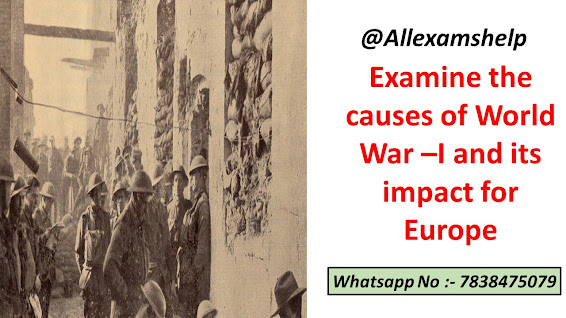Militarism: During the late 19th and early 20th centuries, many countries in Europe believed that having a strong military was essential for maintaining power and protecting their interests. This led to an arms race between major powers, as countries raced to build up their armies and navies.
Examine the causes of
World War –I and its impact for Europe
Alliances: In
the years leading up to World War I, several alliances were formed between
European powers. These alliances were designed to provide mutual defense and
protect against potential threats. However, they also created a complex web of
competing interests that made it difficult to resolve conflicts peacefully.
Imperialism:
Many European countries were engaged in a race to expand their empires, which
often led to competition and tension between them. This was particularly true
in Africa and Asia, where countries vied for control of resources and
territory.
Nationalism:
Nationalism was a powerful force in Europe in the early 20th century, as many
people believed that their country was superior to others. This led to a sense
of competition and rivalry between countries, which made it difficult to
resolve conflicts peacefully.
Loss of life:
World War I was one of the deadliest conflicts in history, with millions of
people losing their lives.
Political
upheaval: The war led to the collapse of several major empires, including the
Austro-Hungarian Empire and the Ottoman Empire. This created political
instability in Europe and set the stage for future conflicts.
Economic
devastation: The war had a devastating impact on Europe's economy, as countries
were forced to spend vast amounts of money on the war effort. The destruction
of infrastructure and loss of life also had long-term economic consequences.
Rise of new
ideologies: The war led to the rise of new ideologies, such as communism and
fascism, which would have a profound impact on the course of European history
in the decades to come.
Formation of
the League of Nations: The League of Nations was formed in the aftermath of
World War I as a way to promote peace and prevent future conflicts. Although
the League ultimately failed to prevent World War II, it laid the groundwork
for the creation of the United Nations.
World War I,
also known as the Great War, was a global conflict that lasted from 1914 to
1918. The war was fought primarily in Europe, but it also involved several
other countries from around the world. The causes of World War I were complex
and multi-faceted, but can be broadly categorized as follows:
Imperialism:
During the late 19th and early 20th centuries, several major European powers
were engaged in a race to expand their empires. This led to competition and
tension between these countries, particularly in Africa and Asia, where
countries vied for control of resources and territory.
Militarism: In
the years leading up to the war, many countries in Europe believed that having
a strong military was essential for maintaining power and protecting their
interests. This led to an arms race between major powers, as countries raced to
build up their armies and navies.
Nationalism:
Nationalism was a powerful force in Europe in the early 20th century, as many
people believed that their country was superior to others. This led to a sense
of competition and rivalry between countries, which made it difficult to
resolve conflicts peacefully.
Alliances:
Several alliances were formed between European powers in the years leading up
to the war. These alliances were designed to provide mutual defense and protect
against potential threats, but they also created a complex web of competing
interests that made it difficult to resolve conflicts peacefully.
For SOLVED PDF & Handwritten
WhatsApp No :- 7838475019
Assassination
of Archduke Franz Ferdinand: The assassination of Archduke Franz Ferdinand, the
heir to the Austro-Hungarian Empire, by a Serbian nationalist in June 1914 was
the immediate trigger for the war. Austria-Hungary declared war on Serbia, and
other countries soon joined the conflict.
The causes of
World War I were complex and interconnected, and the war had far-reaching
impacts on the world, including political upheaval, economic devastation, and
the formation of new ideologies. The war ultimately led to the deaths of
millions of people and set the stage for future conflicts.
